Land Law: Critical Literature Review
VerifiedAdded on 2023/01/11
|9
|2532
|60
AI Summary
This critical literature review explores the concepts of lease and license in English Land Law and their significance in property ownership. It discusses the historical and social significance of land in English property law, the laws governing ownership and rights over land, and the impact of lease and license agreements. The review also highlights landmark cases that have shaped lease and licensing laws in the UK.
Contribute Materials
Your contribution can guide someone’s learning journey. Share your
documents today.
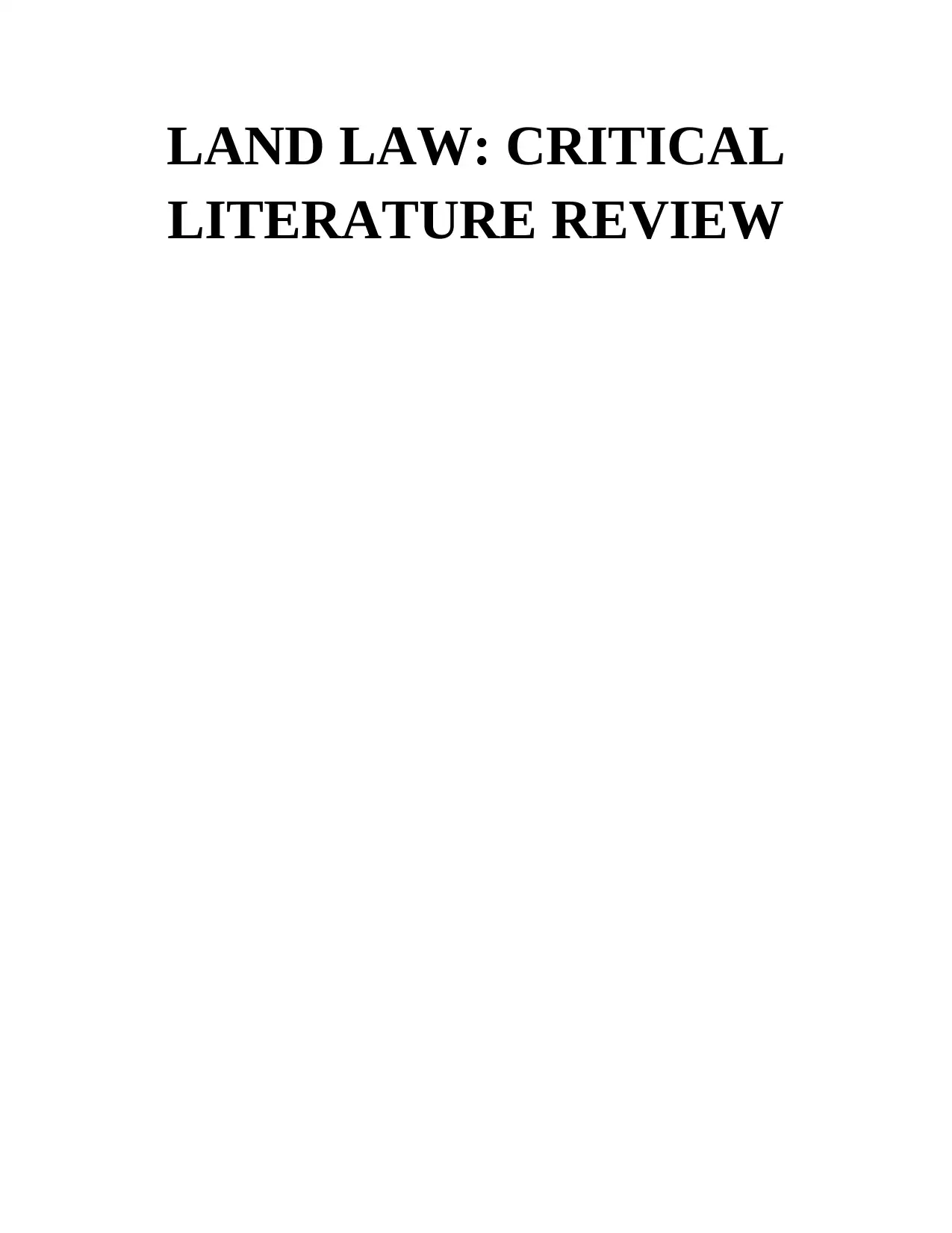
LAND LAW: CRITICAL
LITERATURE REVIEW
LITERATURE REVIEW
Secure Best Marks with AI Grader
Need help grading? Try our AI Grader for instant feedback on your assignments.
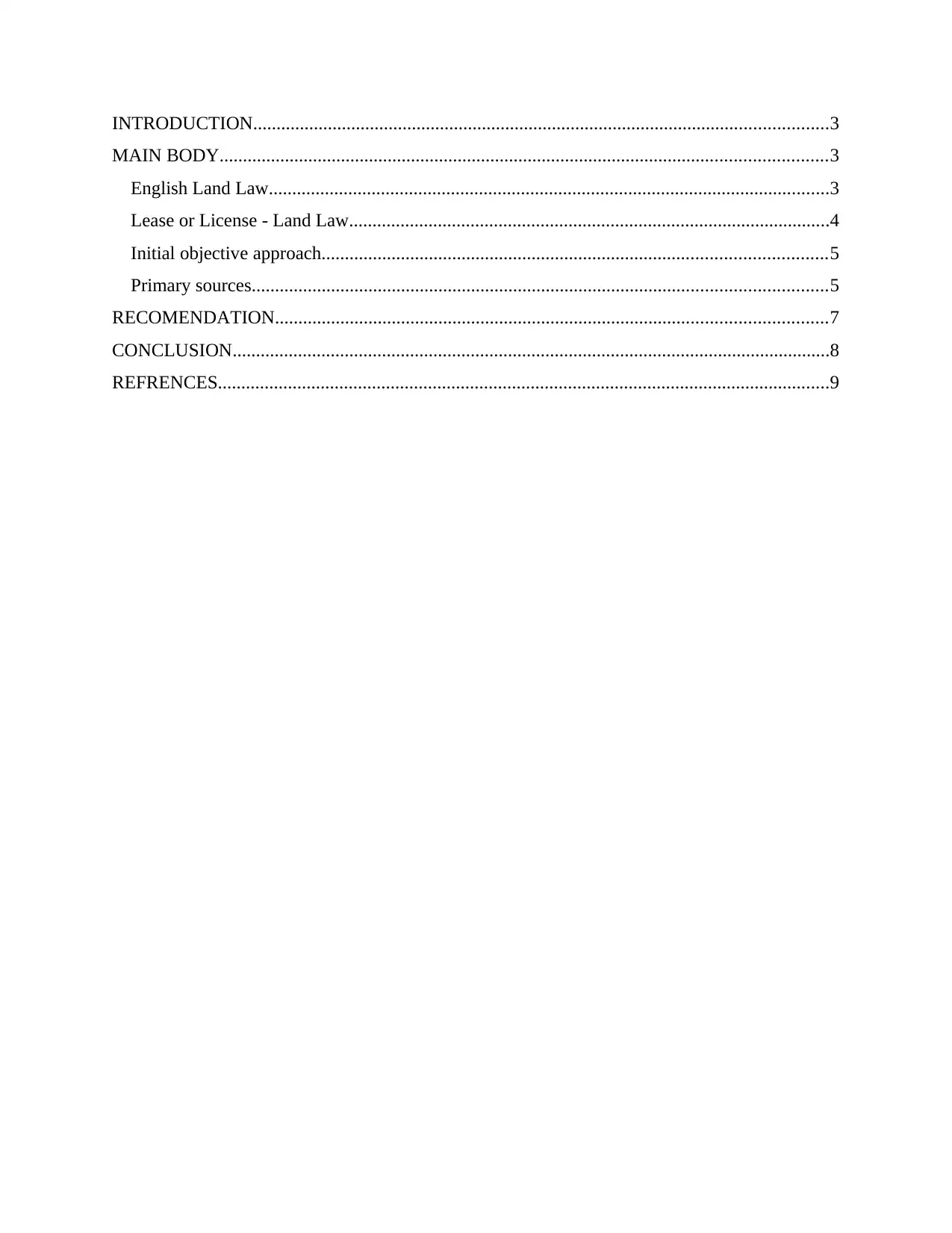
INTRODUCTION...........................................................................................................................3
MAIN BODY..................................................................................................................................3
English Land Law........................................................................................................................3
Lease or License - Land Law.......................................................................................................4
Initial objective approach............................................................................................................5
Primary sources...........................................................................................................................5
RECOMENDATION......................................................................................................................7
CONCLUSION................................................................................................................................8
REFRENCES...................................................................................................................................9
MAIN BODY..................................................................................................................................3
English Land Law........................................................................................................................3
Lease or License - Land Law.......................................................................................................4
Initial objective approach............................................................................................................5
Primary sources...........................................................................................................................5
RECOMENDATION......................................................................................................................7
CONCLUSION................................................................................................................................8
REFRENCES...................................................................................................................................9
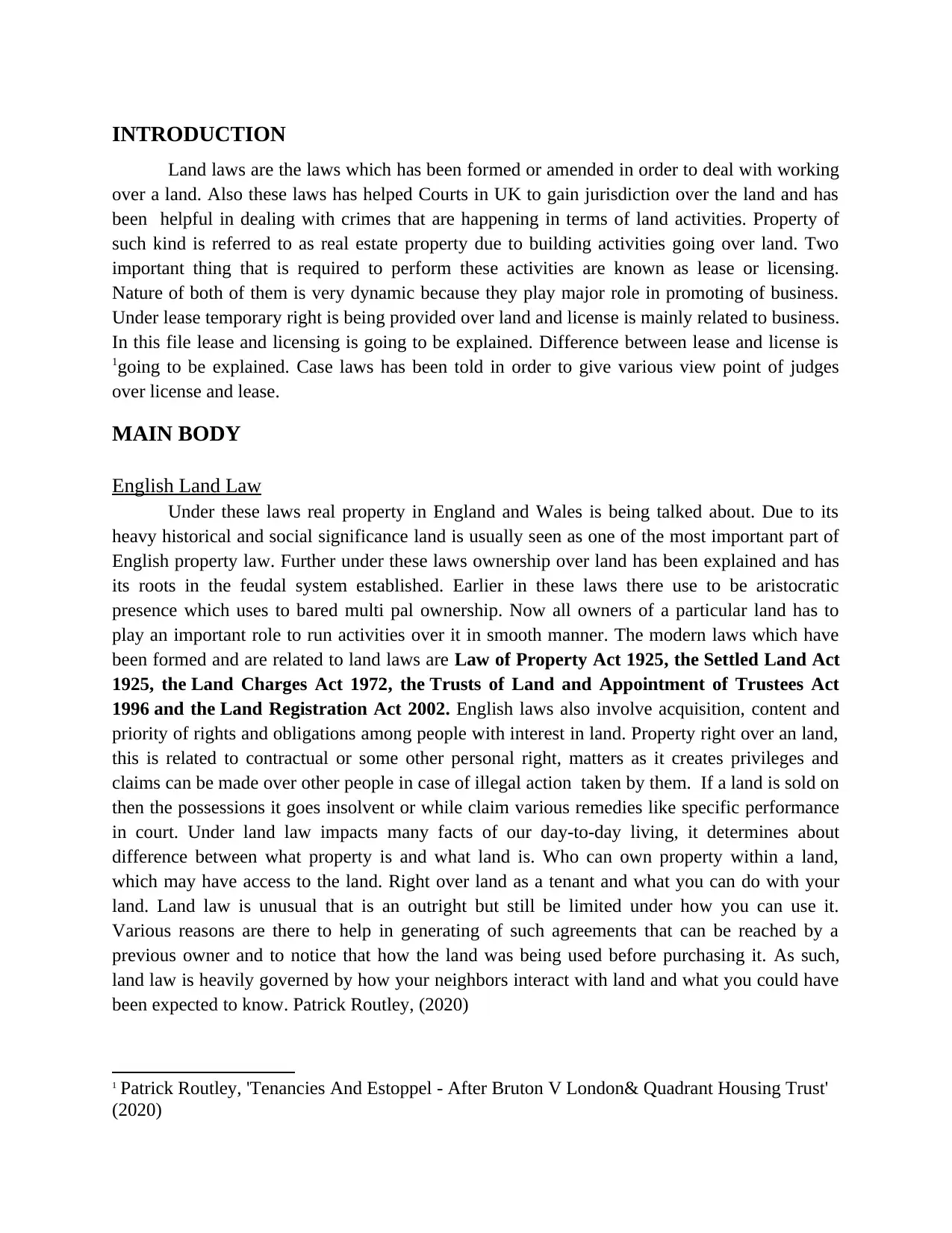
INTRODUCTION
Land laws are the laws which has been formed or amended in order to deal with working
over a land. Also these laws has helped Courts in UK to gain jurisdiction over the land and has
been helpful in dealing with crimes that are happening in terms of land activities. Property of
such kind is referred to as real estate property due to building activities going over land. Two
important thing that is required to perform these activities are known as lease or licensing.
Nature of both of them is very dynamic because they play major role in promoting of business.
Under lease temporary right is being provided over land and license is mainly related to business.
In this file lease and licensing is going to be explained. Difference between lease and license is
1going to be explained. Case laws has been told in order to give various view point of judges
over license and lease.
MAIN BODY
English Land Law
Under these laws real property in England and Wales is being talked about. Due to its
heavy historical and social significance land is usually seen as one of the most important part of
English property law. Further under these laws ownership over land has been explained and has
its roots in the feudal system established. Earlier in these laws there use to be aristocratic
presence which uses to bared multi pal ownership. Now all owners of a particular land has to
play an important role to run activities over it in smooth manner. The modern laws which have
been formed and are related to land laws are Law of Property Act 1925, the Settled Land Act
1925, the Land Charges Act 1972, the Trusts of Land and Appointment of Trustees Act
1996 and the Land Registration Act 2002. English laws also involve acquisition, content and
priority of rights and obligations among people with interest in land. Property right over an land,
this is related to contractual or some other personal right, matters as it creates privileges and
claims can be made over other people in case of illegal action taken by them. If a land is sold on
then the possessions it goes insolvent or while claim various remedies like specific performance
in court. Under land law impacts many facts of our day-to-day living, it determines about
difference between what property is and what land is. Who can own property within a land,
which may have access to the land. Right over land as a tenant and what you can do with your
land. Land law is unusual that is an outright but still be limited under how you can use it.
Various reasons are there to help in generating of such agreements that can be reached by a
previous owner and to notice that how the land was being used before purchasing it. As such,
land law is heavily governed by how your neighbors interact with land and what you could have
been expected to know. Patrick Routley, (2020)
1 Patrick Routley, 'Tenancies And Estoppel - After Bruton V London& Quadrant Housing Trust'
(2020)
Land laws are the laws which has been formed or amended in order to deal with working
over a land. Also these laws has helped Courts in UK to gain jurisdiction over the land and has
been helpful in dealing with crimes that are happening in terms of land activities. Property of
such kind is referred to as real estate property due to building activities going over land. Two
important thing that is required to perform these activities are known as lease or licensing.
Nature of both of them is very dynamic because they play major role in promoting of business.
Under lease temporary right is being provided over land and license is mainly related to business.
In this file lease and licensing is going to be explained. Difference between lease and license is
1going to be explained. Case laws has been told in order to give various view point of judges
over license and lease.
MAIN BODY
English Land Law
Under these laws real property in England and Wales is being talked about. Due to its
heavy historical and social significance land is usually seen as one of the most important part of
English property law. Further under these laws ownership over land has been explained and has
its roots in the feudal system established. Earlier in these laws there use to be aristocratic
presence which uses to bared multi pal ownership. Now all owners of a particular land has to
play an important role to run activities over it in smooth manner. The modern laws which have
been formed and are related to land laws are Law of Property Act 1925, the Settled Land Act
1925, the Land Charges Act 1972, the Trusts of Land and Appointment of Trustees Act
1996 and the Land Registration Act 2002. English laws also involve acquisition, content and
priority of rights and obligations among people with interest in land. Property right over an land,
this is related to contractual or some other personal right, matters as it creates privileges and
claims can be made over other people in case of illegal action taken by them. If a land is sold on
then the possessions it goes insolvent or while claim various remedies like specific performance
in court. Under land law impacts many facts of our day-to-day living, it determines about
difference between what property is and what land is. Who can own property within a land,
which may have access to the land. Right over land as a tenant and what you can do with your
land. Land law is unusual that is an outright but still be limited under how you can use it.
Various reasons are there to help in generating of such agreements that can be reached by a
previous owner and to notice that how the land was being used before purchasing it. As such,
land law is heavily governed by how your neighbors interact with land and what you could have
been expected to know. Patrick Routley, (2020)
1 Patrick Routley, 'Tenancies And Estoppel - After Bruton V London& Quadrant Housing Trust'
(2020)
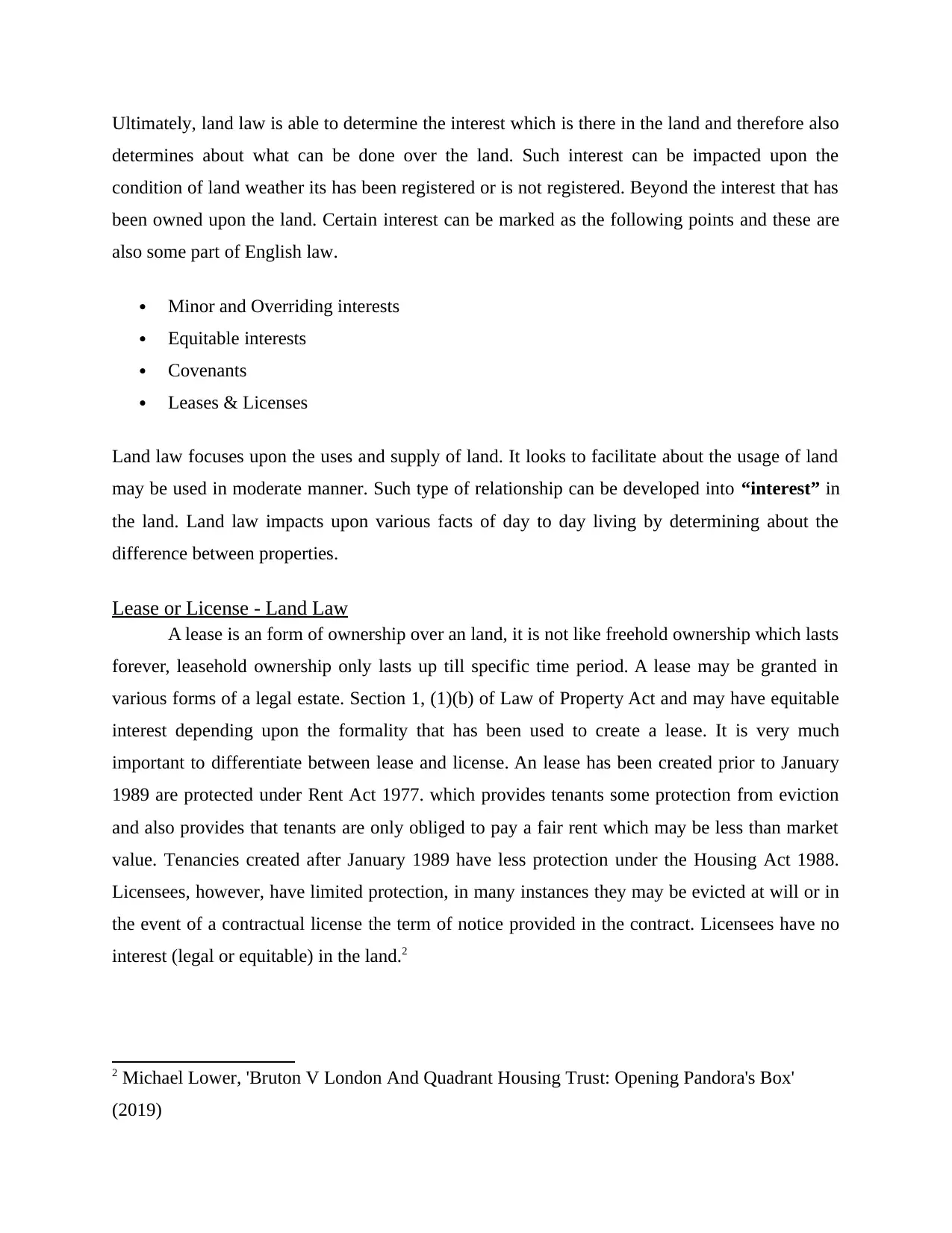
Ultimately, land law is able to determine the interest which is there in the land and therefore also
determines about what can be done over the land. Such interest can be impacted upon the
condition of land weather its has been registered or is not registered. Beyond the interest that has
been owned upon the land. Certain interest can be marked as the following points and these are
also some part of English law.
Minor and Overriding interests
Equitable interests
Covenants
Leases & Licenses
Land law focuses upon the uses and supply of land. It looks to facilitate about the usage of land
may be used in moderate manner. Such type of relationship can be developed into “interest” in
the land. Land law impacts upon various facts of day to day living by determining about the
difference between properties.
Lease or License - Land Law
A lease is an form of ownership over an land, it is not like freehold ownership which lasts
forever, leasehold ownership only lasts up till specific time period. A lease may be granted in
various forms of a legal estate. Section 1, (1)(b) of Law of Property Act and may have equitable
interest depending upon the formality that has been used to create a lease. It is very much
important to differentiate between lease and license. An lease has been created prior to January
1989 are protected under Rent Act 1977. which provides tenants some protection from eviction
and also provides that tenants are only obliged to pay a fair rent which may be less than market
value. Tenancies created after January 1989 have less protection under the Housing Act 1988.
Licensees, however, have limited protection, in many instances they may be evicted at will or in
the event of a contractual license the term of notice provided in the contract. Licensees have no
interest (legal or equitable) in the land.2
2 Michael Lower, 'Bruton V London And Quadrant Housing Trust: Opening Pandora's Box'
(2019)
determines about what can be done over the land. Such interest can be impacted upon the
condition of land weather its has been registered or is not registered. Beyond the interest that has
been owned upon the land. Certain interest can be marked as the following points and these are
also some part of English law.
Minor and Overriding interests
Equitable interests
Covenants
Leases & Licenses
Land law focuses upon the uses and supply of land. It looks to facilitate about the usage of land
may be used in moderate manner. Such type of relationship can be developed into “interest” in
the land. Land law impacts upon various facts of day to day living by determining about the
difference between properties.
Lease or License - Land Law
A lease is an form of ownership over an land, it is not like freehold ownership which lasts
forever, leasehold ownership only lasts up till specific time period. A lease may be granted in
various forms of a legal estate. Section 1, (1)(b) of Law of Property Act and may have equitable
interest depending upon the formality that has been used to create a lease. It is very much
important to differentiate between lease and license. An lease has been created prior to January
1989 are protected under Rent Act 1977. which provides tenants some protection from eviction
and also provides that tenants are only obliged to pay a fair rent which may be less than market
value. Tenancies created after January 1989 have less protection under the Housing Act 1988.
Licensees, however, have limited protection, in many instances they may be evicted at will or in
the event of a contractual license the term of notice provided in the contract. Licensees have no
interest (legal or equitable) in the land.2
2 Michael Lower, 'Bruton V London And Quadrant Housing Trust: Opening Pandora's Box'
(2019)
Secure Best Marks with AI Grader
Need help grading? Try our AI Grader for instant feedback on your assignments.
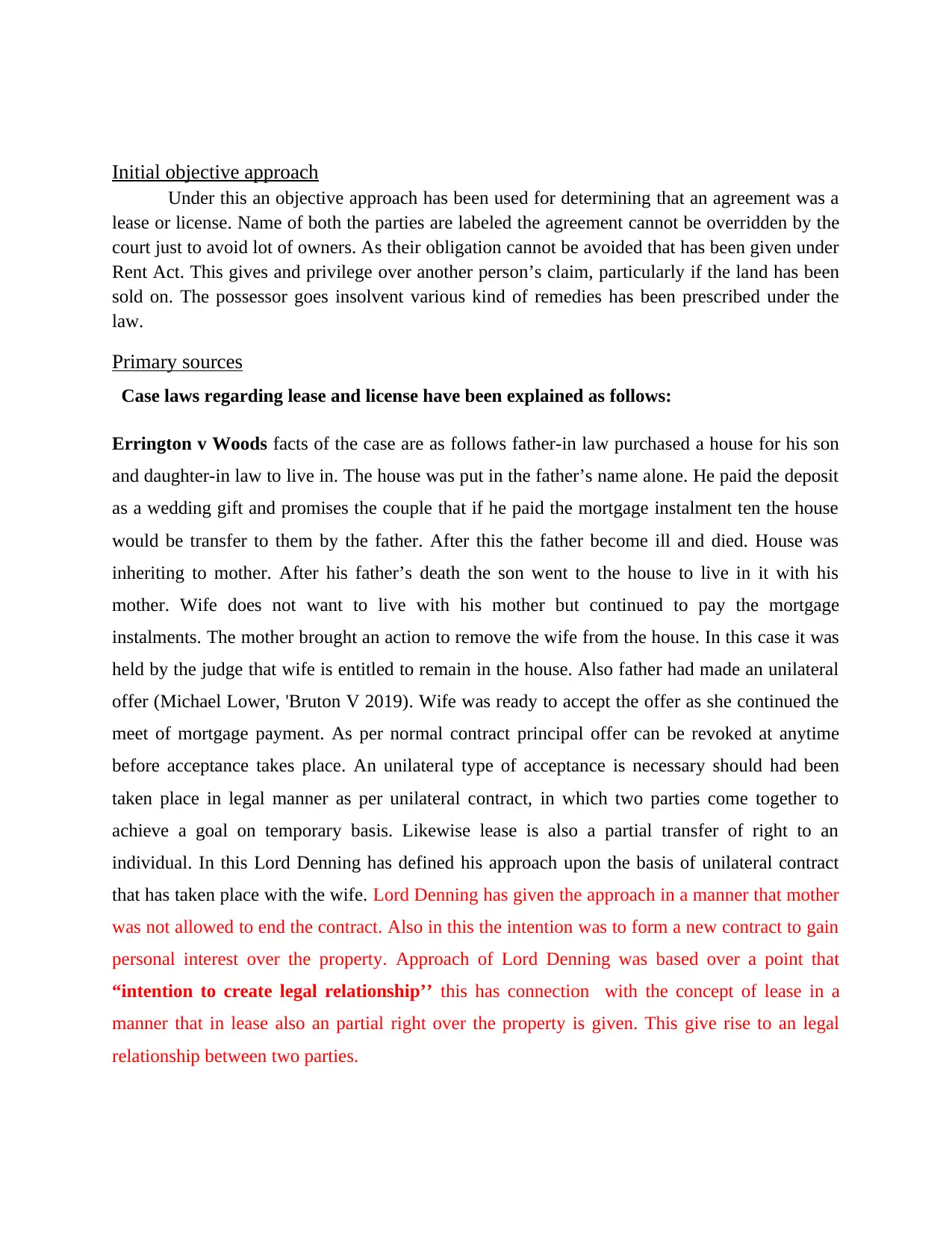
Initial objective approach
Under this an objective approach has been used for determining that an agreement was a
lease or license. Name of both the parties are labeled the agreement cannot be overridden by the
court just to avoid lot of owners. As their obligation cannot be avoided that has been given under
Rent Act. This gives and privilege over another person’s claim, particularly if the land has been
sold on. The possessor goes insolvent various kind of remedies has been prescribed under the
law.
Primary sources
Case laws regarding lease and license have been explained as follows:
Errington v Woods facts of the case are as follows father-in law purchased a house for his son
and daughter-in law to live in. The house was put in the father’s name alone. He paid the deposit
as a wedding gift and promises the couple that if he paid the mortgage instalment ten the house
would be transfer to them by the father. After this the father become ill and died. House was
inheriting to mother. After his father’s death the son went to the house to live in it with his
mother. Wife does not want to live with his mother but continued to pay the mortgage
instalments. The mother brought an action to remove the wife from the house. In this case it was
held by the judge that wife is entitled to remain in the house. Also father had made an unilateral
offer (Michael Lower, 'Bruton V 2019). Wife was ready to accept the offer as she continued the
meet of mortgage payment. As per normal contract principal offer can be revoked at anytime
before acceptance takes place. An unilateral type of acceptance is necessary should had been
taken place in legal manner as per unilateral contract, in which two parties come together to
achieve a goal on temporary basis. Likewise lease is also a partial transfer of right to an
individual. In this Lord Denning has defined his approach upon the basis of unilateral contract
that has taken place with the wife. Lord Denning has given the approach in a manner that mother
was not allowed to end the contract. Also in this the intention was to form a new contract to gain
personal interest over the property. Approach of Lord Denning was based over a point that
“intention to create legal relationship’’ this has connection with the concept of lease in a
manner that in lease also an partial right over the property is given. This give rise to an legal
relationship between two parties.
Under this an objective approach has been used for determining that an agreement was a
lease or license. Name of both the parties are labeled the agreement cannot be overridden by the
court just to avoid lot of owners. As their obligation cannot be avoided that has been given under
Rent Act. This gives and privilege over another person’s claim, particularly if the land has been
sold on. The possessor goes insolvent various kind of remedies has been prescribed under the
law.
Primary sources
Case laws regarding lease and license have been explained as follows:
Errington v Woods facts of the case are as follows father-in law purchased a house for his son
and daughter-in law to live in. The house was put in the father’s name alone. He paid the deposit
as a wedding gift and promises the couple that if he paid the mortgage instalment ten the house
would be transfer to them by the father. After this the father become ill and died. House was
inheriting to mother. After his father’s death the son went to the house to live in it with his
mother. Wife does not want to live with his mother but continued to pay the mortgage
instalments. The mother brought an action to remove the wife from the house. In this case it was
held by the judge that wife is entitled to remain in the house. Also father had made an unilateral
offer (Michael Lower, 'Bruton V 2019). Wife was ready to accept the offer as she continued the
meet of mortgage payment. As per normal contract principal offer can be revoked at anytime
before acceptance takes place. An unilateral type of acceptance is necessary should had been
taken place in legal manner as per unilateral contract, in which two parties come together to
achieve a goal on temporary basis. Likewise lease is also a partial transfer of right to an
individual. In this Lord Denning has defined his approach upon the basis of unilateral contract
that has taken place with the wife. Lord Denning has given the approach in a manner that mother
was not allowed to end the contract. Also in this the intention was to form a new contract to gain
personal interest over the property. Approach of Lord Denning was based over a point that
“intention to create legal relationship’’ this has connection with the concept of lease in a
manner that in lease also an partial right over the property is given. This give rise to an legal
relationship between two parties.
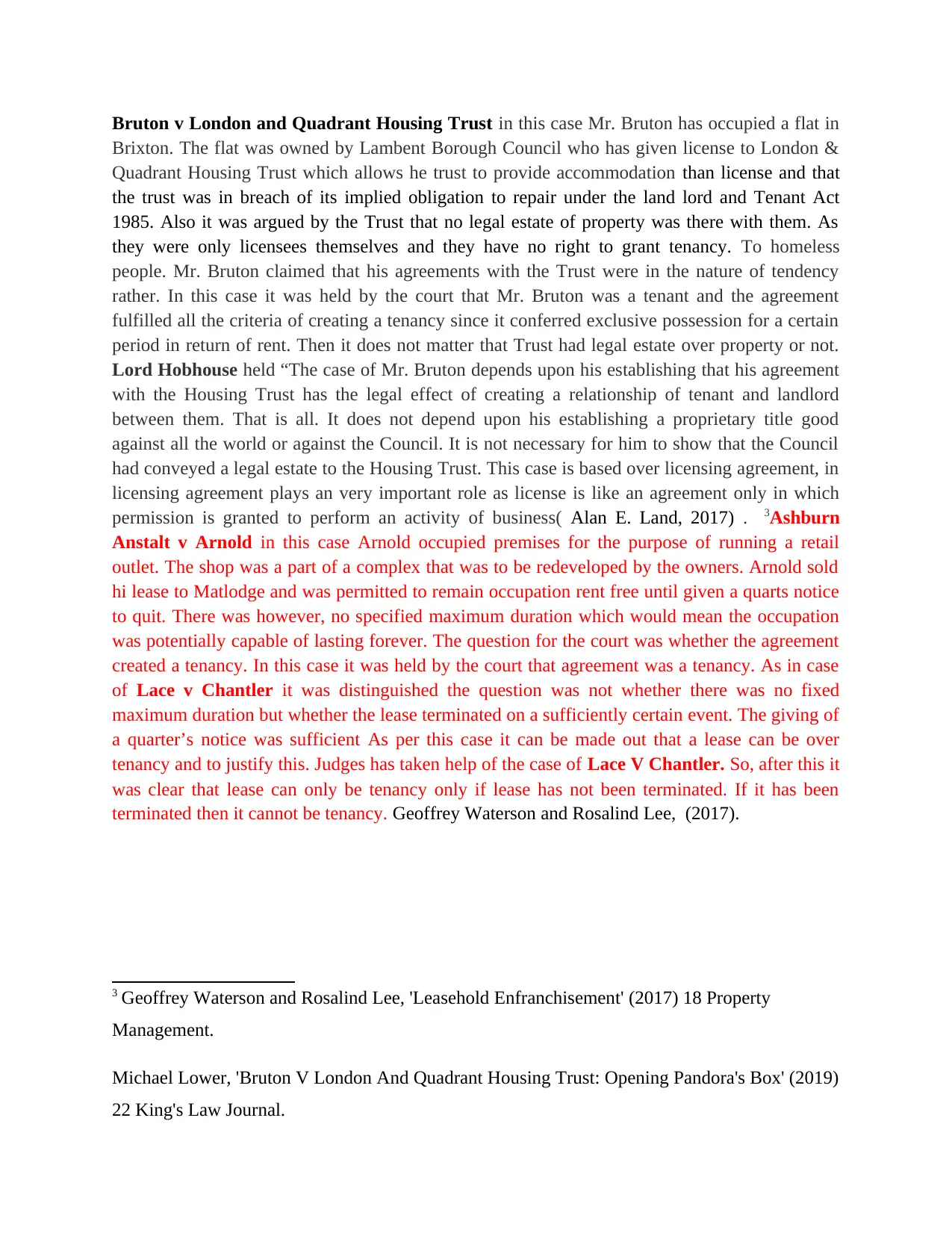
Bruton v London and Quadrant Housing Trust in this case Mr. Bruton has occupied a flat in
Brixton. The flat was owned by Lambent Borough Council who has given license to London &
Quadrant Housing Trust which allows he trust to provide accommodation than license and that
the trust was in breach of its implied obligation to repair under the land lord and Tenant Act
1985. Also it was argued by the Trust that no legal estate of property was there with them. As
they were only licensees themselves and they have no right to grant tenancy. To homeless
people. Mr. Bruton claimed that his agreements with the Trust were in the nature of tendency
rather. In this case it was held by the court that Mr. Bruton was a tenant and the agreement
fulfilled all the criteria of creating a tenancy since it conferred exclusive possession for a certain
period in return of rent. Then it does not matter that Trust had legal estate over property or not.
Lord Hobhouse held “The case of Mr. Bruton depends upon his establishing that his agreement
with the Housing Trust has the legal effect of creating a relationship of tenant and landlord
between them. That is all. It does not depend upon his establishing a proprietary title good
against all the world or against the Council. It is not necessary for him to show that the Council
had conveyed a legal estate to the Housing Trust. This case is based over licensing agreement, in
licensing agreement plays an very important role as license is like an agreement only in which
permission is granted to perform an activity of business( Alan E. Land, 2017) . 3Ashburn
Anstalt v Arnold in this case Arnold occupied premises for the purpose of running a retail
outlet. The shop was a part of a complex that was to be redeveloped by the owners. Arnold sold
hi lease to Matlodge and was permitted to remain occupation rent free until given a quarts notice
to quit. There was however, no specified maximum duration which would mean the occupation
was potentially capable of lasting forever. The question for the court was whether the agreement
created a tenancy. In this case it was held by the court that agreement was a tenancy. As in case
of Lace v Chantler it was distinguished the question was not whether there was no fixed
maximum duration but whether the lease terminated on a sufficiently certain event. The giving of
a quarter’s notice was sufficient As per this case it can be made out that a lease can be over
tenancy and to justify this. Judges has taken help of the case of Lace V Chantler. So, after this it
was clear that lease can only be tenancy only if lease has not been terminated. If it has been
terminated then it cannot be tenancy. Geoffrey Waterson and Rosalind Lee, (2017).
3 Geoffrey Waterson and Rosalind Lee, 'Leasehold Enfranchisement' (2017) 18 Property
Management.
Michael Lower, 'Bruton V London And Quadrant Housing Trust: Opening Pandora's Box' (2019)
22 King's Law Journal.
Brixton. The flat was owned by Lambent Borough Council who has given license to London &
Quadrant Housing Trust which allows he trust to provide accommodation than license and that
the trust was in breach of its implied obligation to repair under the land lord and Tenant Act
1985. Also it was argued by the Trust that no legal estate of property was there with them. As
they were only licensees themselves and they have no right to grant tenancy. To homeless
people. Mr. Bruton claimed that his agreements with the Trust were in the nature of tendency
rather. In this case it was held by the court that Mr. Bruton was a tenant and the agreement
fulfilled all the criteria of creating a tenancy since it conferred exclusive possession for a certain
period in return of rent. Then it does not matter that Trust had legal estate over property or not.
Lord Hobhouse held “The case of Mr. Bruton depends upon his establishing that his agreement
with the Housing Trust has the legal effect of creating a relationship of tenant and landlord
between them. That is all. It does not depend upon his establishing a proprietary title good
against all the world or against the Council. It is not necessary for him to show that the Council
had conveyed a legal estate to the Housing Trust. This case is based over licensing agreement, in
licensing agreement plays an very important role as license is like an agreement only in which
permission is granted to perform an activity of business( Alan E. Land, 2017) . 3Ashburn
Anstalt v Arnold in this case Arnold occupied premises for the purpose of running a retail
outlet. The shop was a part of a complex that was to be redeveloped by the owners. Arnold sold
hi lease to Matlodge and was permitted to remain occupation rent free until given a quarts notice
to quit. There was however, no specified maximum duration which would mean the occupation
was potentially capable of lasting forever. The question for the court was whether the agreement
created a tenancy. In this case it was held by the court that agreement was a tenancy. As in case
of Lace v Chantler it was distinguished the question was not whether there was no fixed
maximum duration but whether the lease terminated on a sufficiently certain event. The giving of
a quarter’s notice was sufficient As per this case it can be made out that a lease can be over
tenancy and to justify this. Judges has taken help of the case of Lace V Chantler. So, after this it
was clear that lease can only be tenancy only if lease has not been terminated. If it has been
terminated then it cannot be tenancy. Geoffrey Waterson and Rosalind Lee, (2017).
3 Geoffrey Waterson and Rosalind Lee, 'Leasehold Enfranchisement' (2017) 18 Property
Management.
Michael Lower, 'Bruton V London And Quadrant Housing Trust: Opening Pandora's Box' (2019)
22 King's Law Journal.
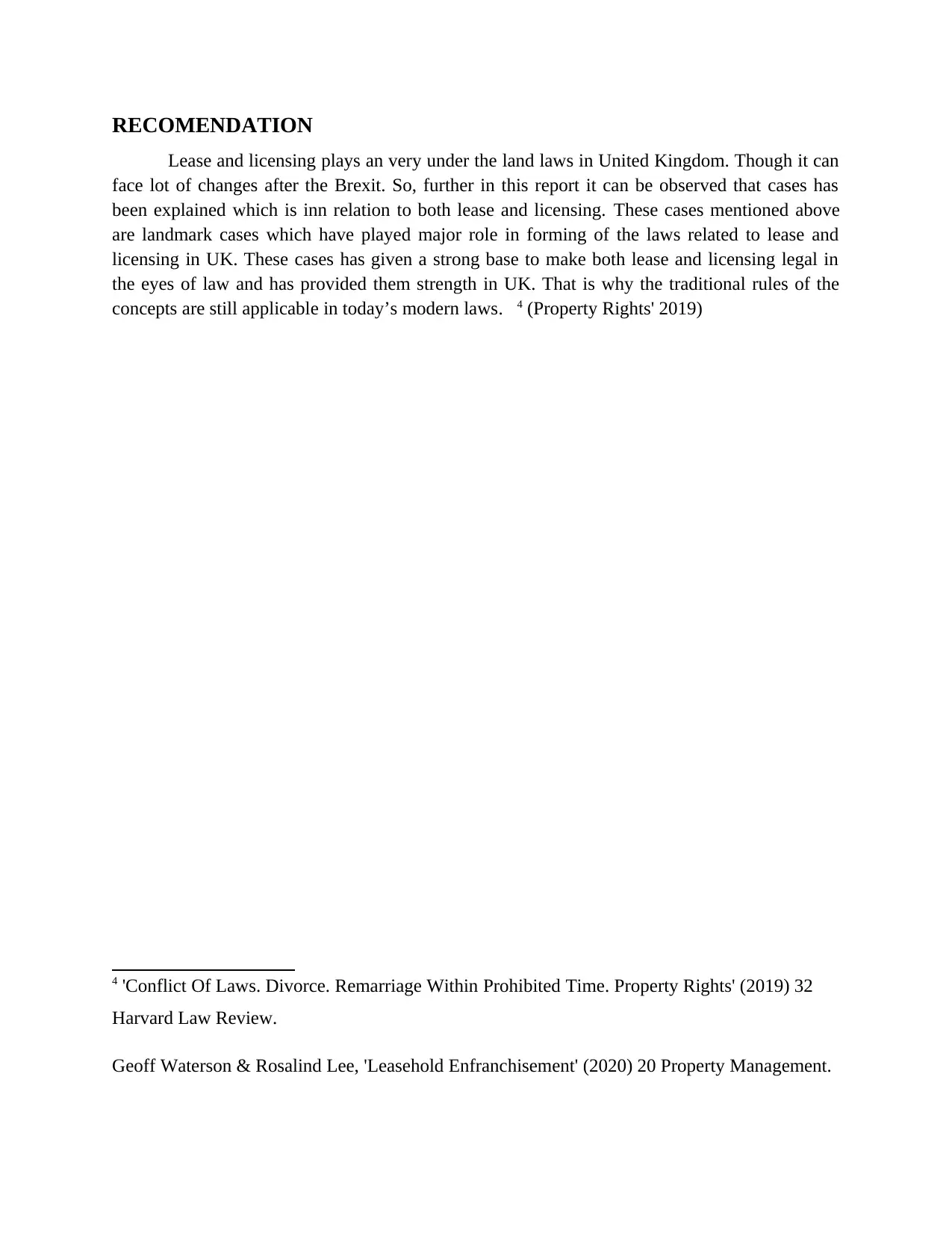
RECOMENDATION
Lease and licensing plays an very under the land laws in United Kingdom. Though it can
face lot of changes after the Brexit. So, further in this report it can be observed that cases has
been explained which is inn relation to both lease and licensing. These cases mentioned above
are landmark cases which have played major role in forming of the laws related to lease and
licensing in UK. These cases has given a strong base to make both lease and licensing legal in
the eyes of law and has provided them strength in UK. That is why the traditional rules of the
concepts are still applicable in today’s modern laws. 4 (Property Rights' 2019)
4 'Conflict Of Laws. Divorce. Remarriage Within Prohibited Time. Property Rights' (2019) 32
Harvard Law Review.
Geoff Waterson & Rosalind Lee, 'Leasehold Enfranchisement' (2020) 20 Property Management.
Lease and licensing plays an very under the land laws in United Kingdom. Though it can
face lot of changes after the Brexit. So, further in this report it can be observed that cases has
been explained which is inn relation to both lease and licensing. These cases mentioned above
are landmark cases which have played major role in forming of the laws related to lease and
licensing in UK. These cases has given a strong base to make both lease and licensing legal in
the eyes of law and has provided them strength in UK. That is why the traditional rules of the
concepts are still applicable in today’s modern laws. 4 (Property Rights' 2019)
4 'Conflict Of Laws. Divorce. Remarriage Within Prohibited Time. Property Rights' (2019) 32
Harvard Law Review.
Geoff Waterson & Rosalind Lee, 'Leasehold Enfranchisement' (2020) 20 Property Management.
Paraphrase This Document
Need a fresh take? Get an instant paraphrase of this document with our AI Paraphraser
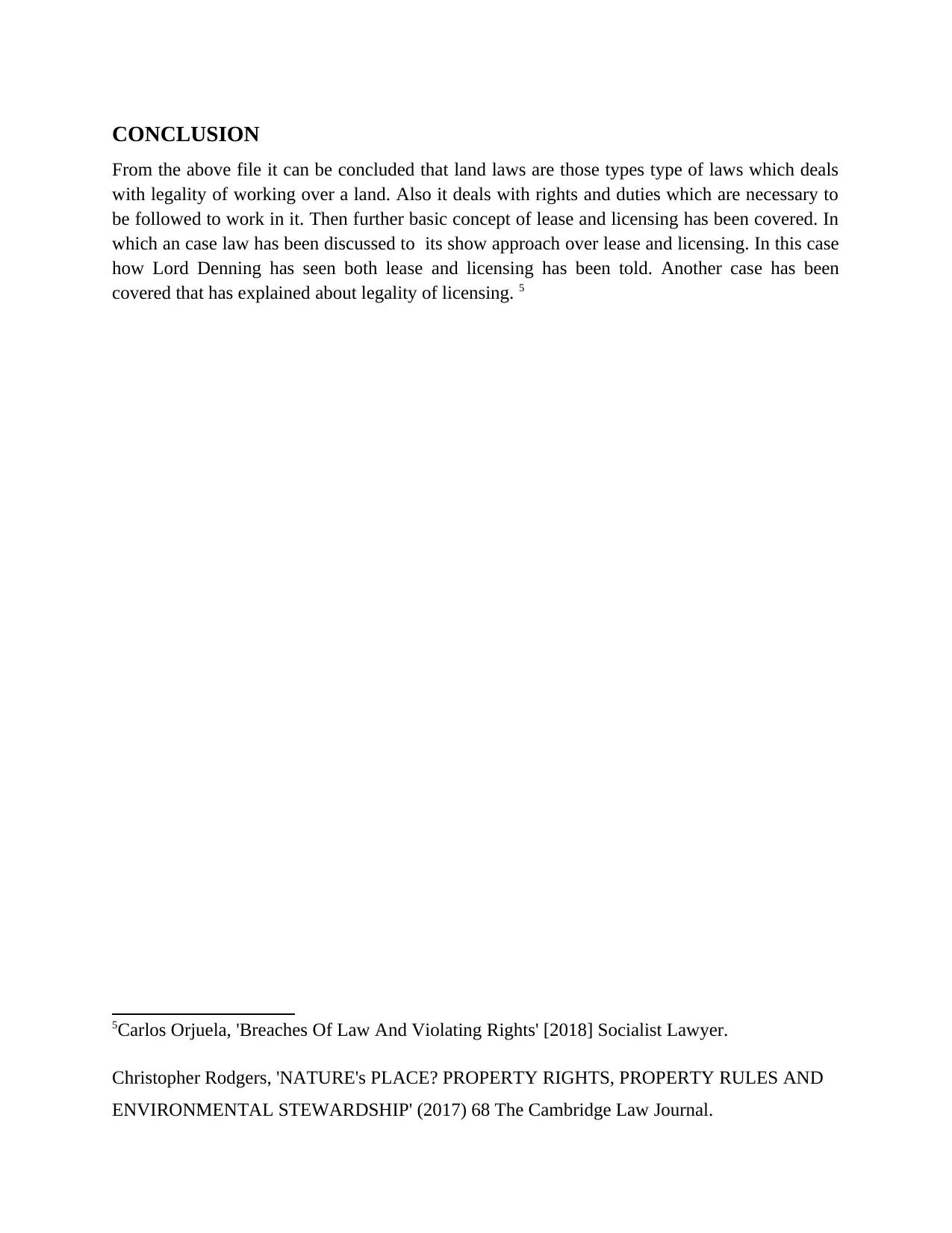
CONCLUSION
From the above file it can be concluded that land laws are those types type of laws which deals
with legality of working over a land. Also it deals with rights and duties which are necessary to
be followed to work in it. Then further basic concept of lease and licensing has been covered. In
which an case law has been discussed to its show approach over lease and licensing. In this case
how Lord Denning has seen both lease and licensing has been told. Another case has been
covered that has explained about legality of licensing. 5
5Carlos Orjuela, 'Breaches Of Law And Violating Rights' [2018] Socialist Lawyer.
Christopher Rodgers, 'NATURE's PLACE? PROPERTY RIGHTS, PROPERTY RULES AND
ENVIRONMENTAL STEWARDSHIP' (2017) 68 The Cambridge Law Journal.
From the above file it can be concluded that land laws are those types type of laws which deals
with legality of working over a land. Also it deals with rights and duties which are necessary to
be followed to work in it. Then further basic concept of lease and licensing has been covered. In
which an case law has been discussed to its show approach over lease and licensing. In this case
how Lord Denning has seen both lease and licensing has been told. Another case has been
covered that has explained about legality of licensing. 5
5Carlos Orjuela, 'Breaches Of Law And Violating Rights' [2018] Socialist Lawyer.
Christopher Rodgers, 'NATURE's PLACE? PROPERTY RIGHTS, PROPERTY RULES AND
ENVIRONMENTAL STEWARDSHIP' (2017) 68 The Cambridge Law Journal.
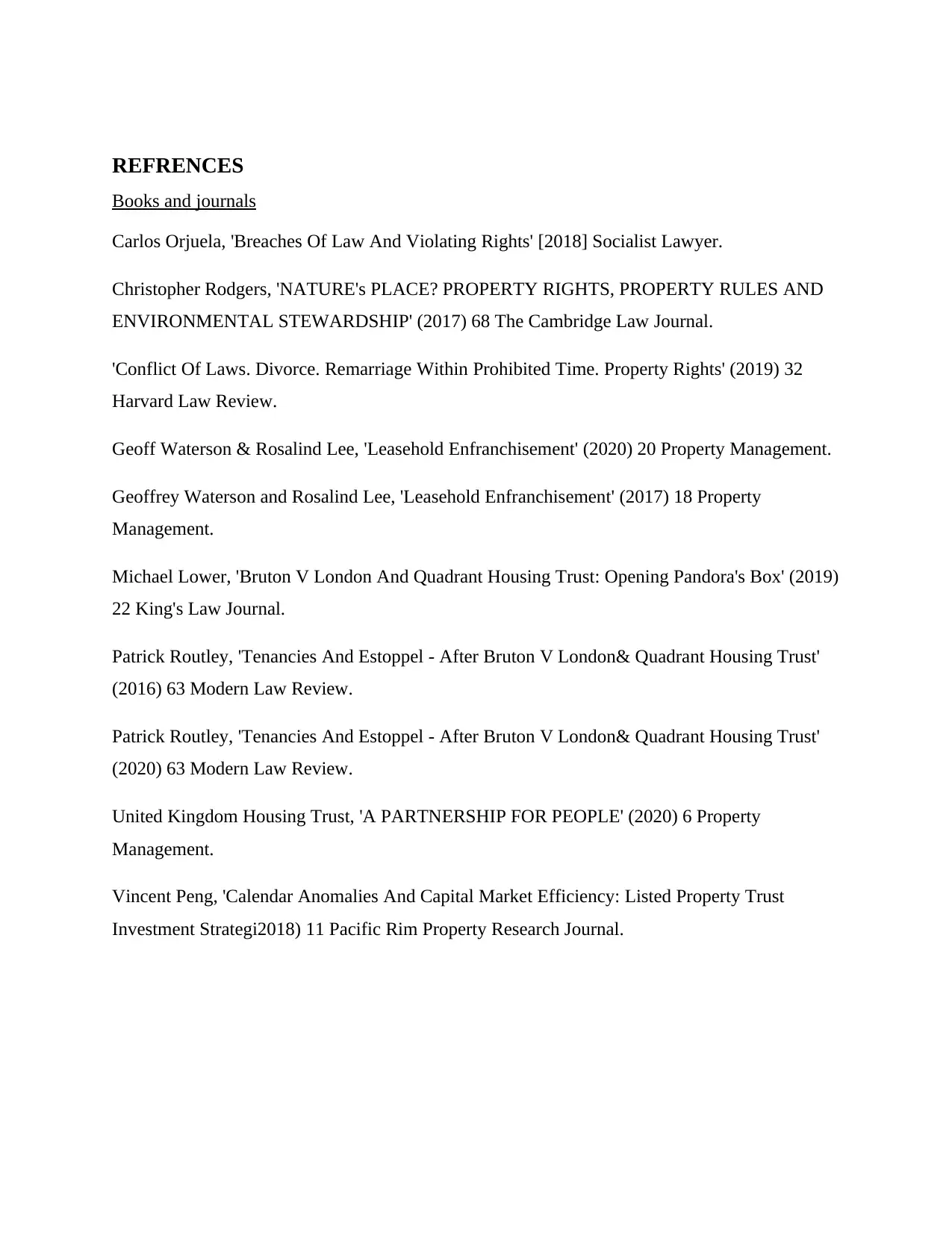
REFRENCES
Books and journals
Carlos Orjuela, 'Breaches Of Law And Violating Rights' [2018] Socialist Lawyer.
Christopher Rodgers, 'NATURE's PLACE? PROPERTY RIGHTS, PROPERTY RULES AND
ENVIRONMENTAL STEWARDSHIP' (2017) 68 The Cambridge Law Journal.
'Conflict Of Laws. Divorce. Remarriage Within Prohibited Time. Property Rights' (2019) 32
Harvard Law Review.
Geoff Waterson & Rosalind Lee, 'Leasehold Enfranchisement' (2020) 20 Property Management.
Geoffrey Waterson and Rosalind Lee, 'Leasehold Enfranchisement' (2017) 18 Property
Management.
Michael Lower, 'Bruton V London And Quadrant Housing Trust: Opening Pandora's Box' (2019)
22 King's Law Journal.
Patrick Routley, 'Tenancies And Estoppel - After Bruton V London& Quadrant Housing Trust'
(2016) 63 Modern Law Review.
Patrick Routley, 'Tenancies And Estoppel - After Bruton V London& Quadrant Housing Trust'
(2020) 63 Modern Law Review.
United Kingdom Housing Trust, 'A PARTNERSHIP FOR PEOPLE' (2020) 6 Property
Management.
Vincent Peng, 'Calendar Anomalies And Capital Market Efficiency: Listed Property Trust
Investment Strategi2018) 11 Pacific Rim Property Research Journal.
Books and journals
Carlos Orjuela, 'Breaches Of Law And Violating Rights' [2018] Socialist Lawyer.
Christopher Rodgers, 'NATURE's PLACE? PROPERTY RIGHTS, PROPERTY RULES AND
ENVIRONMENTAL STEWARDSHIP' (2017) 68 The Cambridge Law Journal.
'Conflict Of Laws. Divorce. Remarriage Within Prohibited Time. Property Rights' (2019) 32
Harvard Law Review.
Geoff Waterson & Rosalind Lee, 'Leasehold Enfranchisement' (2020) 20 Property Management.
Geoffrey Waterson and Rosalind Lee, 'Leasehold Enfranchisement' (2017) 18 Property
Management.
Michael Lower, 'Bruton V London And Quadrant Housing Trust: Opening Pandora's Box' (2019)
22 King's Law Journal.
Patrick Routley, 'Tenancies And Estoppel - After Bruton V London& Quadrant Housing Trust'
(2016) 63 Modern Law Review.
Patrick Routley, 'Tenancies And Estoppel - After Bruton V London& Quadrant Housing Trust'
(2020) 63 Modern Law Review.
United Kingdom Housing Trust, 'A PARTNERSHIP FOR PEOPLE' (2020) 6 Property
Management.
Vincent Peng, 'Calendar Anomalies And Capital Market Efficiency: Listed Property Trust
Investment Strategi2018) 11 Pacific Rim Property Research Journal.
1 out of 9
Related Documents
Your All-in-One AI-Powered Toolkit for Academic Success.
+13062052269
info@desklib.com
Available 24*7 on WhatsApp / Email
![[object Object]](/_next/static/media/star-bottom.7253800d.svg)
Unlock your academic potential
© 2024 | Zucol Services PVT LTD | All rights reserved.





